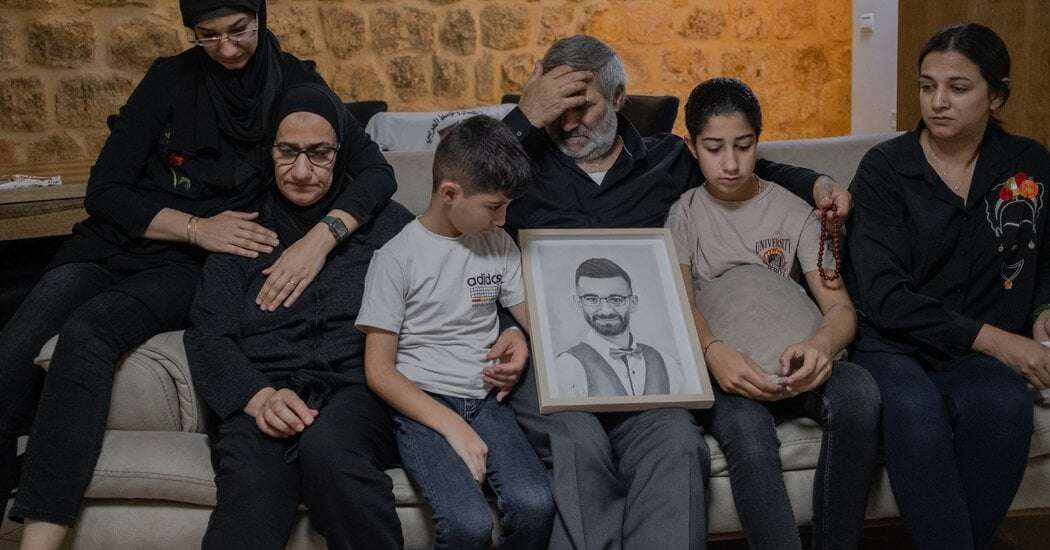Awad Darawshe, shot in the abdomen, bled to death under the stage at the trance music festival that Hamas gunmen transformed into a killing field. A Palestinian Israeli paramedic, he died in a desperate attempt to save the lives of Jews at the Tribe of Nova peace-and-love gathering that marked the Jewish holiday of Sukkot.
Mr. Darawshe, 23, was at the festival as part of a small team of paramedics working for Yossi Ambulances, an Israeli company recruited to take care of routine medical emergencies. His colleagues fled when the shooting began, but he “felt compelled to help people as one human being to another,” said Mohammad Darawshe, a cousin who is himself a prominent mediator between Palestinians and Jews.
A young Palestinian Israeli citizen committed to peace and killed by Islamist Hamas terrorists in the Jewish homeland, Awad Darawshe may appear to be an apt symbol of the utter defeat of the bridge-builders still committed to a peaceful settlement of the Israeli-Palestinian conflict. Yet, often marginalized, mocked as naïve and targeted as traitors, some of these stubborn advocates of peacemaking now see an opportunity, however remote, in the aftermath of Hamas’s slaughter of more than 1,400 Israelis.
The calls for a war like no other to root out Hamas “once and for all,” a consensus in Israel’s national unity government and much of Israeli society, will blunt their voices for now. The peacemakers are in the minority as a devastating invasion of Gaza looms.
But the Hamas attack has shattered Prime Minister Benjamin Netanyahu’s conviction that the conflict — insoluble in his view — could be managed by “mowing the grass,” in the dismissive Israeli expression for periodic weeding out of Palestinian militancy.
That state of drift, in which peace had become a forgotten or even risible word, now feels untenable. The Israeli cultivation of Hamas, intended to ensure that Palestinians remained split between the more moderate Palestinian Authority in the West Bank and the rulers of Gaza, so making Palestinian statehood impossible, is a policy in shreds. The notion that the Palestinians would drift passively off into the ether as Israel normalized relations with Arab states like Bahrain or Morocco looks more misplaced than ever.

BluuWarbler on October 22nd, 2023 at 17:16 UTC »
Why wouldn't a separate Palestinian state be as doable as other times over the past half century? Not to mistake the mood of a particularly tragic moment for the entirety.
It's also not as if a month ago stasis and resistance to movement to a separate state hadn't been entrenched on effectively both sides for years. An era of rise in RW authoritarianism, especially in Israel, may not be the best time to shake that up, but it is shaken now.
Both Hamas and to a lesser degree Palestinian Authority are bad authoritarian governments, and freedom from both, the possibility of a free state, has very strong appeal among those people. In Israel, reportedly a large majority want Netanyahu to resign.
A new state wouldn't have to be entirely Arab Palestinian. After all, 21% of Israeli citizens are Arab/Muslim/Palestinian, 73% Jewish (@70% of those actually indigenous or with ancestry indigenous to the greater ME area).
Itm, even before that, just a move to applying land use law and principles as intended when written would undo hopefully much of the more recent surge in illegal settlement.
yesmaybeyes on October 22nd, 2023 at 11:25 UTC »
Promote agnosticism or atheism, the groups have fought enough.
jogarz on October 22nd, 2023 at 11:18 UTC »
Submission Statement:
There was a lot of fatalism regarding the Israeli-Palestinian conflict even before the current war broke out, and now that pessimism seems higher than ever. I wanted to share this article to not because I don’t feel this pessimism (I do), but because I feel it’s valuable to show another perspective.
Wars are always horrible, but they can change people’s mindsets and alter political landscape very rapidly. So, perversely, there is a chance that this conflict might make a solution more feasible in the future. I feel this section is most relevant:
I think a good deal of the fatalism regarding the conflict comes from three ideas:
Israelis are so comfortable with the current status quo re:Palestine that they see no need to vote for politicians who want to shake it up. West Bank settlements have made a separate Palestinian state geographically untenable. This means any “peace” agreement would have to be a one state solution, which Jews would never accept as it would mean their inevitable subjugation under Arab rule, which would likely lead to them being persecuted. The governmental split in Palestine is impossible to fix, and Hamas will remain in power in Gaza in perpetuity. Since Hamas does not desire peace with Israel, no peace can be made.As terrible as it sounds, current events could change all these things. Netanyahu has not been politically bolstered by these attacks; early polling seems to indicate that he’s now in hot water and may not survive until the next election. It remains to be seen, though, if his ideology regarding the conflict has been discredited, or just himself personally. Two states with a land swap is still feasible, there just has to be leadership willing to do it. And this war could very well end with Hamas being destroyed, or severally crippled to the point where it can’t compete politically anymore,